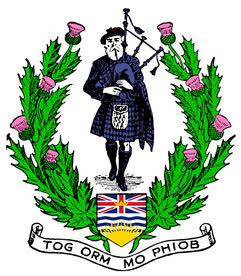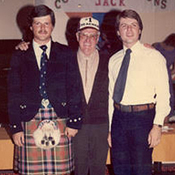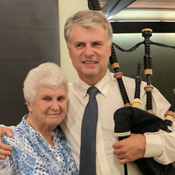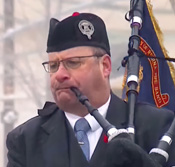It was good evening of piping, hosted by Bob & Mary McIlwaine.
Jack Lee introduced his tune, Lament for MacDonald of Kinlochmoidart #1, by illustrating the difference between tune #1 and #2, the latter being considered a Salute. Like so many others, the origin of the tune is lost in the mists of time. There is a tradition that the tune was originally played as a lament for Munro of Foulis. Munro was killed at the Battle of Falkirk, 1746 while serving on the Government side; the tune was reputed to have been played at his graveside with many Jacobite officers in attendance. MacDonald of Kinlochmoidart, a highly respected man, was on the Jacobite side. He was taken prisoner, tried and hanged. Despite the uncertain origin, there is little doubt that the tune has a connection with the Jacobite uprising of 1745/46. It is a fine tune, grandly played by Jack.
Kyle Bantra played Lament for Sir James Macdonald of the Isles, Sir James was the 9th Chief of the Macdonald’s of Sleat (Mac Dhomnuill nan Eilean). In his time he was considered the inheritor of the Lordship of the Isles, a title forfeited in the late 16th century. He fought under the banner of King Charles I at the Battle of Worcester in 1651. The tune is credited to William MacDonald of Vallay (MacDonald’s tutor).
Andrew Lee presented a well-played Lament for the Viscount of Dundee.
David MacNeill followed with Glengarry’s Lament. Alastair Ranaldson MacDonell was the 15th Chief of Clanranald and 22nd from the founder of the MacDonald of the Isles line. A notoriously extravagant Chief, he left his estate with an enormous debt when he died in 1828. The tune was composed by his piper, Archibald Munro. It is said that it was played at his graveside by six pipers.
John Lee gave us the Desperate Battle (of the Birds).
Edward MacIlwaine closed the meeting with a wonderfully fine tune, not played at the Club before. The Lament for Rory MacLeod (usually presented as Rory MacLoud’s Lament) was probably composed by Patrick Mor MacCrimmon. Although there is no absolute certainty, Rory the Witty, the 17th Chief of the MacLeod’s of Dunvegan, is believed to be the Chief for whom the tune was composed. He died young in 1664, not yet 30 years of age. Of the other two Chiefs who bore the name Ruaridh, one was the great Sir Ruaridh Mor, Xvth Chief, who died in 1626. The other was the much despised Ruaridh, XIXth Chief, who turned management of the estate over to people who abandonded the Gaelic mode of life and turned Dunvegan into a fashionable English establishment. It was in this period that the Gaelic poetess Mary MacLeod was banished for not singing the Chief’s praises in her poetry – an unlikely candidate for a piobaireachd.
The date of the next meeting is yet to be determined.




